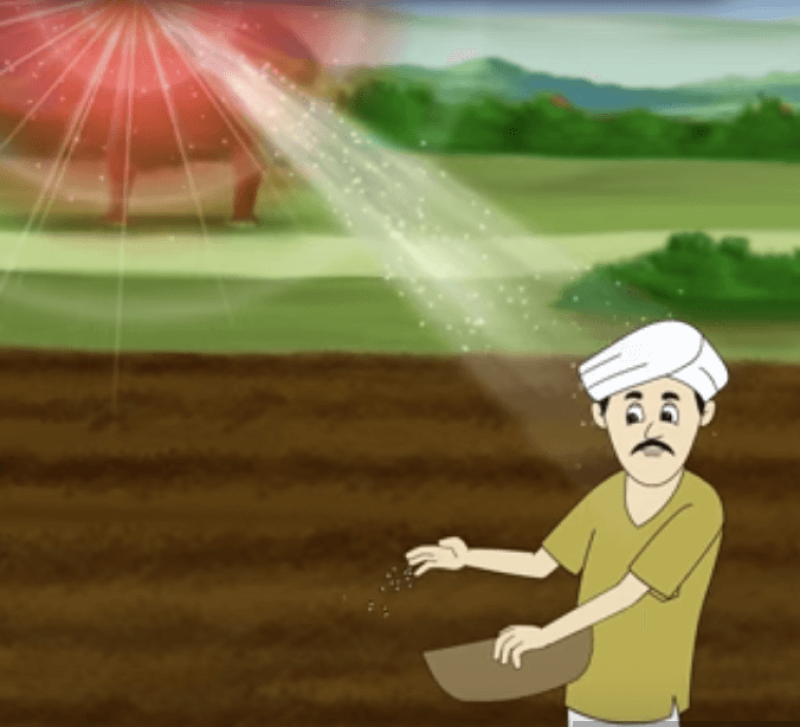Wonder why India has an agricultural crisis?
Forget fertilizer; if you send tomatoes good vibrations of “peace, love and divinity” they will grow more vigorously. You can “empower” seeds through meditation. These propositions are absurd to anyone with even a rudimentary knowledge of science, but not to Indian Agriculture Minister Radha Mohan Singh.
India of course has been locked into a battle between advocates of modern agricultural techniques, including the use of genetically modified seeds, and proponents of more traditional organic based practices. Early in the 2000s, the country introduced GMO cotton engineered to reduce the spraying of insecticides, and it’s been a huge hit, turning the country into a net exporter of cotton and sharply increasing the income of farmers, but it’s not come without controversy. Many critics say it subverts traditional agrarian practices, Apparently they have the ear of the country’s agricultural minister.
The Minister has endorsed the practice of “sustainable yogic agriculture” (SYA) in which farmers practice meditation not only to improve the health of their plants, but also to improve their own mental and spiritual health. Farmers also use integrated organic farming techniques like crop rotation and cow manure fertilizers, but its the meditation that differentiates SYA from standard organic farming. Singh is quoted as saying that meditation will “enhance fertility of the soil. It will help activity of micro-organisms in the soil too.”
If you are cynical, you might guess that SYA was dreamed up in Santa Barbara or some other affluent, trendy community, someplace where Westerners have embraced (and in some cases perverted) the Hindu discipline of yoga not only as a form of exercise, but also as a gimmick to sell overpriced activewear and organic teas. But you’d be wrong.
SYA was developed by the Brahma Kumaris, a religious movement that originated in what is now Pakistan in the 1930s. The movement centers around the teaching of Raja Yoga, a form of meditation that “redefines the self as a soul and enables a direct connection and relationship with the Supreme Source of purest energy and highest consciousness.”
The supposed effect of Raja Yoga meditation on agriculture was discovered in 2007 when farmers who were studying at the Brahma Kumaris World Spiritual University in India decided to try an experiment with an infertile, barren plot of land. They claim that through meditation alone, without the use of fertilizers (synthetic or organic), they were able to enrich the soil and restore its suitability for growing plants.
The Brahma Kumaris are not an inconsequential movement. They claim to have more than 800,000 students in over 100 countries. But perhaps more importantly the movement has the cachet of being associated with the United Nations. The Brahma Kumaris operates as an NGO with consultative status with the Economic and Social Council among others and is a flagship member of the Food and Agricultural Organization and Education for Rural People.
SYA is being taken seriously not just by Singh, but also the Indian Council for Agricultural Research which hosted a seminar on the practice in 2013 and promised to study it. It was also discussed among delegates to the UN’s COP18 conference on climate change in late 2012.
But is SYA effective? There are no independent, scientific studies of the practice. The Brahma Kumaris are conducting their own five year study and claim that preliminary results show improved seed germination and quality of produce.
Still, why would India’s Agriculture Minister endorse a practice that with no evidence of effectiveness other than the word of its devotees? Perhaps it has something to do with India’s farmer suicide problem. Thousands of financially pressed farmers take their lives every year, an unsettling practice that has been going on for decades as many poor farmers struggling with high debts and iffy yields.
Recently, Singh has made remarks about the suicide crisis that were taken by some as insensitive victim blaming. As one of the main goals of SYA is improving the mental health of farmers, perhaps Singh sees promoting SYA as a more constructive approach to addressing the suicide issue. Singh is quoted in The Indian Express:
We are supporting organic farming and, along with it, the idea of Rajyog [meditation]. Such exercise is accepted by my ministry essentially to enhance Indian farmers’ confidence. Indian farmers have, over the years, lost confidence in the age-tested knowledge of farming.
While the potential for mediation to improve farmer’s mental health is certainly more plausible and evidence based, SYA’s effectiveness as an agricultural technique has no basis in science. Many see the Agriculture Minister’s endorsement of the technique as “premature and ill-advised.”
Meredith Swett Walker is the GeneTrends Daily Digest editor for the Genetic Literacy Project. Follow her on Twitter @mswettwalker































